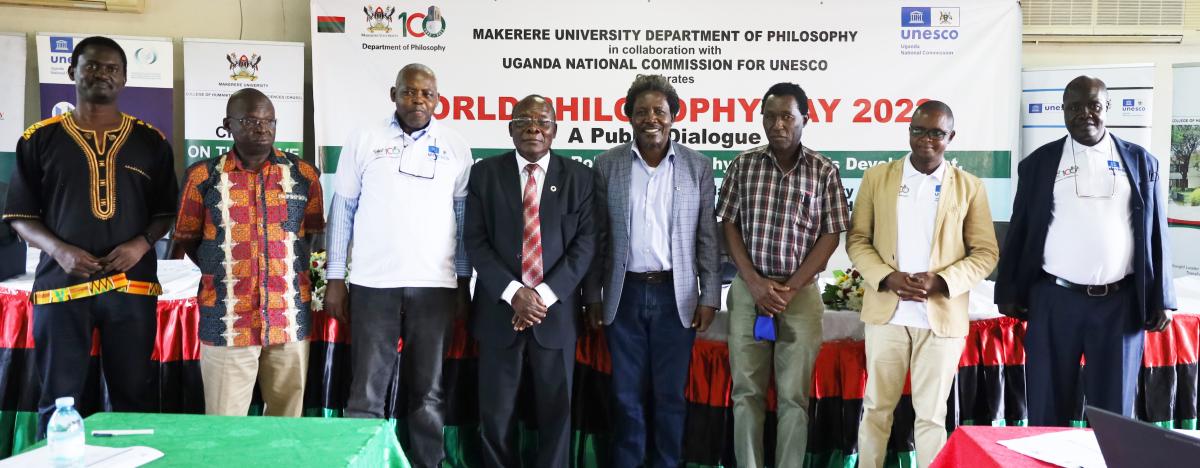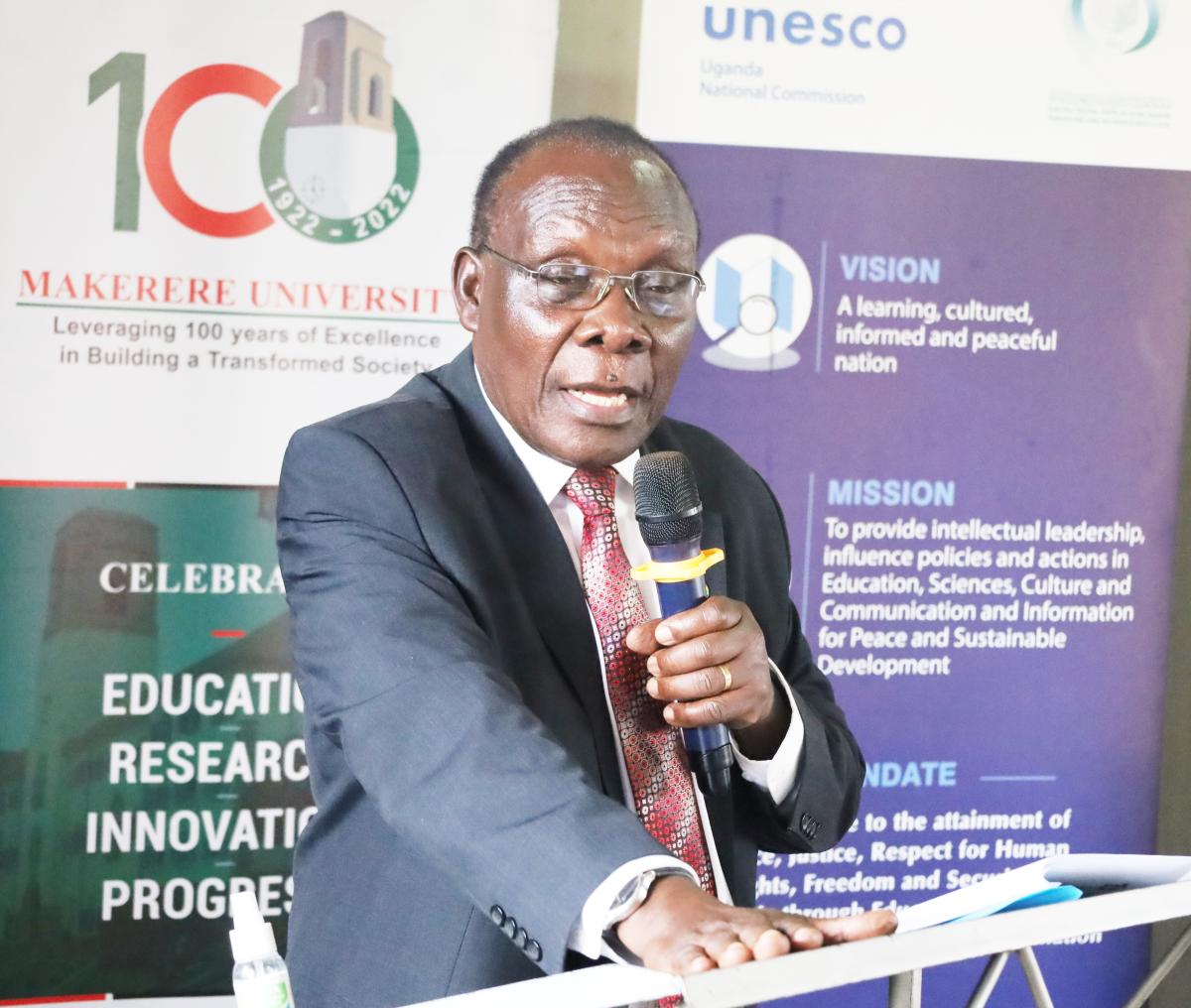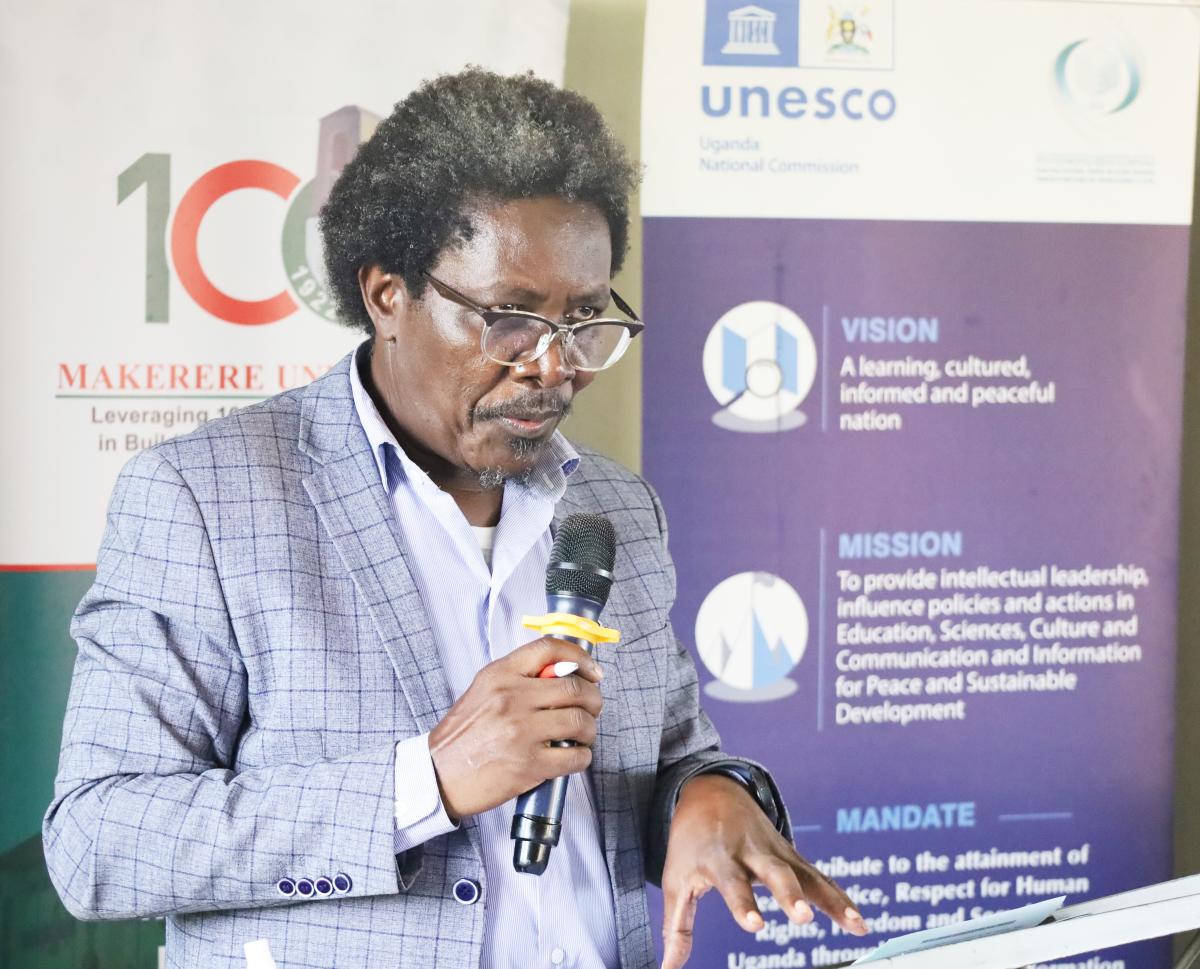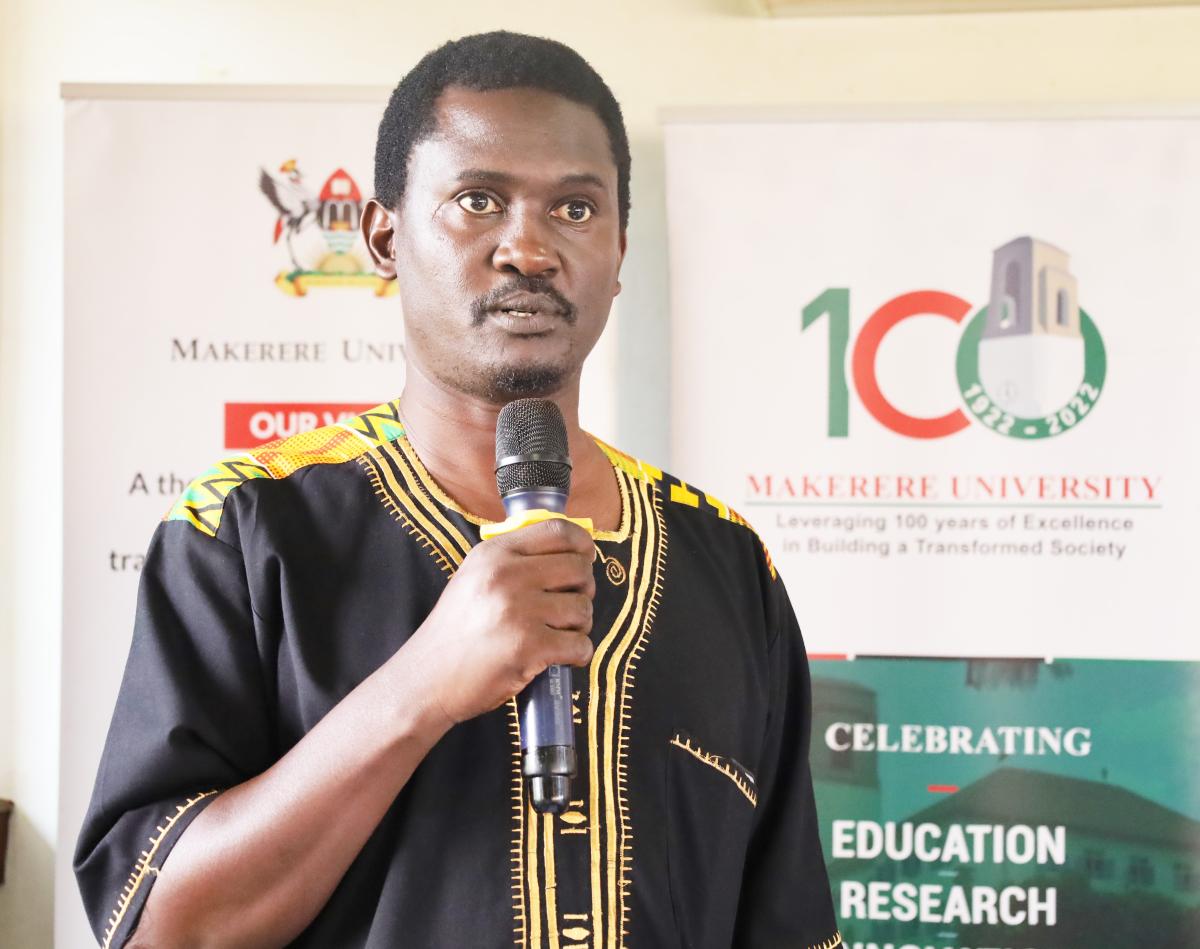
Makerere University Department of Philosophy together with the Uganda National Commission for UNESCO (UNATCOM) on 17th November ,2022 joined the rest of the world to celebrate the 20th World Philosophy Day with a call for reforms in Uganda’s education system to make Philosophy a cross cutting and compulsory course.
This year’s celebration under the Global theme, “Humans of the Future”. Uganda chose to refine the theme to speak to pressing challenges hence the theme, "Harnessing Philosophy for addressing Uganda’s Development challenges”.
The World Philosophy Day coincided with Makerere University’s celebration of 100 years of existence and service to humanity and offered an opportunity both to celebrate the immense contribution made by Philosophy in understanding the world and to further reflect.
Amidst the ongoing debates on the importance of the Humanities, the debate at this event steered conversation among the academia, government, civil society and the general public on how Philosophy can inform progress in various aspects of individual and national aspirations.

Scholars argued that Uganda has a creativity, anticipation and the empathy gap premised in philosophy and that the humanity and humanism in this country cannot be restored unless the philosophical approach is resustated. Unfortunately, philosophy is taught at higher levels in universities and when people search for courses, philosophy becomes the last opt option not taken as a serious course yet the country needs people to be patriotic, hopeful for the sake of development.
Convening at Makerere University Senate Conference Hall, the celebrants stressed that development cannot be achieved without including philosophy which starts with developing the human mind philosophically so that man is at peace with the environment sustainably.
When young people are in malaise bored in the morning, scholars asserted that you can only harness their strength to work for the development of this country when they have the philosophy and tenets for hope. Philosophy in that regard, brings that hope, critical thinking in humanity that is why philosophy should be a crosscutting course like communication skills, ICT and Ethics.
For example, people are downgrading all the swamps, trees are being cut but people do not think about tomorrow. Shall we teach that in textbooks and examine that? The fact that people do not have the philosophical mind even to think of what they are going to leave for their children and the future generation, is partly the reason humanities scholars say need philosophy in colleges and institutions of higher learning.
Major propositions from the meeting
- Parliament of Uganda enacts a policy that makes the teaching of Philosophy compulsory at all educational levels.
- Makerere University works with other stakeholders to draft a proposal and submit to the Education Policy Review Commission (EPRC) chaired by the former Education and Public Service Minister Amanya Mushega.
- Makerere University mobilises other stakeholders to draft a paper to the President of the Republic of Uganda through the Directorate of Ethics and Integrity on the role of Humanities and Social Sciences in addressing Uganda’s development challenges.
- Makerere university champions and rolls out dialogues in public, private and non-governmental organizations and the general public on the importance of humanities and social sciences, and philosophy in particular.
Presiding over the function as Chief Guest, the Chairman Board of Governors Uganda National Commission for UNESCO Prof. Eliabu Lugujjo said UNESCO has urged its member states to take philosophy as a unifier and an intersection in human development.

To him, the first activity required for this involves the preparation of a study about the present state of teaching of philosophy in the world as an indispensable pre requisite for any future activity in this domain, since alert, enlightened reflection is the guarantor of action that is intelligent and to the point.
Lugujjo stressed that Philosophy finds its place at the intersection of education and the social sciences and humanities. In Uganda, he observed that there is an emphasis on the immediate utility of disciplines that are offered in higher institutions of learning with the priority being technological sciences.
“But we forget that the ideal utility is in itself philosophical. Even the concept Science cannot be understood outside of philosophy…. We should understand that natural and technological science have roots in pre-socratic, medieval and modern philosophical thought” He asserted
This according to Lugujjo implies that meaningful science should be founded in philosophy. In the area of humanities and social sciences, philosophy offers among others criticality, creativity and humanness that form the essence of such disciplines and therefore philosophy is a cross cutting discipline.
“…Philosophy should be given a special attention in Uganda’s academia and practice. Let us take an example of the political challenges we have gone through as a people; the immediate question is how can we co-exist? If we stopped asking such questions, the dignity of human person, respect for others, tolerance, social justice and liberty lose meaning and we may go back to the state of nature as postulated by Thomas Hobbes, where there is war of each against all”, He stressed.
Taking an example of corruption and social injustices and their far reaching implications on the wellbeing of Ugandans, Prof. Lugujjo challenged participants to ask hard questions about the root cause and what ought to be done.
“Whereas STEM is good, it must be done with philosophy at the background because you cannot build a bridge without considering the impact to society or construct a road without considering the sociological aspect of what you are doing. Science can germinate more, when it considers the humanities”, the professor stated.

The Principal College of Humanities and Social Sciences represented by Prof. Patrick Mangeni said the conversation on the Harnessing Philosophy for addressing Uganda’s Development challenges is critical and important for the academia.
“In a number of cases, many people do not seem to appreciate the role of the knowledge seeking discipline and disposition it brings to our lives. We are in a take away generation where thinking is left as a preserve of the isolated field. It is important when we locate our discipline and conversation within the realm of knowledge because a number of people take humanities as less contributing in its base to development.” Mangeni said.
Unlike other countries where highly and A – scoring students enroll to pursue philosophy Mangeni decried that in Uganda, the program is taken as a last resort after applicants fail to secure places of their priority courses. He however reported that within the limitations, departments have continued to do tremendous work and endeavored to make students appreciate the subject.
“We have produced students with excellent performance and have moved out and made an impact to many countries and that can be testified by the number of people in the field of philosophy”.
Professor Mangeni described the day’s conversation as significant in terms of visibility imploring the head of Department to devise means of sharing them out and come up with more activities such as public lectures and seminars in the field of philosophy.

The Head Department of Philosophy Dr. Spire Ssentongo thanked all participants for honoring the invitation to celebrate and having a constructive conversation inspired by philosophy saying the engagement will discredit the unfortunate believe that philosophy is basically an area of highly abstract matters and air splitting that has little to do with life and existing challenges of society.
Dr. Spire urged colleagues in the field of philosophy to demystify the impression that philosophy is about big grammar adding that anyone who sets out to communicate yet deliberately making it difficult for others to understand, can only be described as crazy.
“It is my hope that today is about a conversation that will make realistic efforts to be understood. One of the challenges of philosophy today is that it continues to live without proving its importance to anyone that cannot find it.
Philosophy appears to carry the attitude of a mother who may seem to look on as her children denounce her uselessness. She may frown and curse but not so to refute them. This has become a challenge because we live in a world where unfortunately the value of things is measured by whether they are defined by the powerful or not”, He said.
Dr. Spire observed that philosophy today finds itself on a shaky ground in neoliberal terms where the education is left to the market and forces of demand and supply to determine what is worth. In addition, philosophy continues to be threatened in a harsh world of scientism that is growing more than critical thinking.
“Philosophers in the past lived a quiet life of pursuing knowledge without a burden of proving their relevance in material path and now forced to join the crazy stampede of territory, money and disciplinary survival. Philosophers may choose to lament about these changes and stringent demand of them but we also need to remember the African saying: - that the groans of the goat does not stop the seller dragging it to the market.
As we work for a better educational order, in the meantime we may need to ask ourselves how do we position ourselves in the markets that is the reason for mobilizing this conversation but without totally surrendering it to the whims of the market”, He challenged.
Dr. Spire said the beauty of philosophical discussion which sound is construed as a weakness, is that it is characterized by constant questioning adding that once something has an answer, it ceases to be philosophy and becomes an entirely new discipline hence the continuous breakaway of disciplines from philosophy from history.
“Whereas philosophical inquiry may not provide direct answers, it produces questions that may handle it to the discovery of answers as well as the discovery of new disciplines. While philosophy is not a hard science, it contemplative discussion has contributed and still contributes to the creation of hard sciences.
Much of what we know today for scientific facts started with philosophical speculation through asking difficult questions challenging convention wisdom. In view of the above approach philosophy is unlike other disciplines in the sense that it does not limit itself to a particular matter the way biology speaks about living things for example. Philosophy focuses on un answered questions of various subjects and beyond old disciplines”, He explained.
The World Philosophy Day
This year 2022, the world celebrates the 20th Philosophy day that was initiated by UNESCO in 2002 by UNESCO General Conference that highlighted the importance of this discipline especially for young people. The general Conference underlined that Philosophy is a discipline that encourages critical and independent thought and is capable of working towards better understating of the world and promoting tolerance and peace.
UNESCO hopes to promote philosophical reflections throughout the world by opening spaces and encouraging people to share their philosophical heritage, opening their minds to new ideas, and inspiring public debate on society’s challenges.
The commemoration of the World Philosophy day on the third Thursday of November is reported to be associated with the birthday of Plato, a Greek philosopher born in Anthens during the classical period in ancient Greece. UNESCO as the initiator leads the World Philosophy Day but does not own it. It belongs to everyone who cares about philosophy.
This year’s Global theme is, “Humans of the Future” given the contestation about the concept, “human” and that human being of today has been affected a lot by politics, economics, socialization, science and technology which have an implication on the human being of the future in terms of development especially in Uganda.
